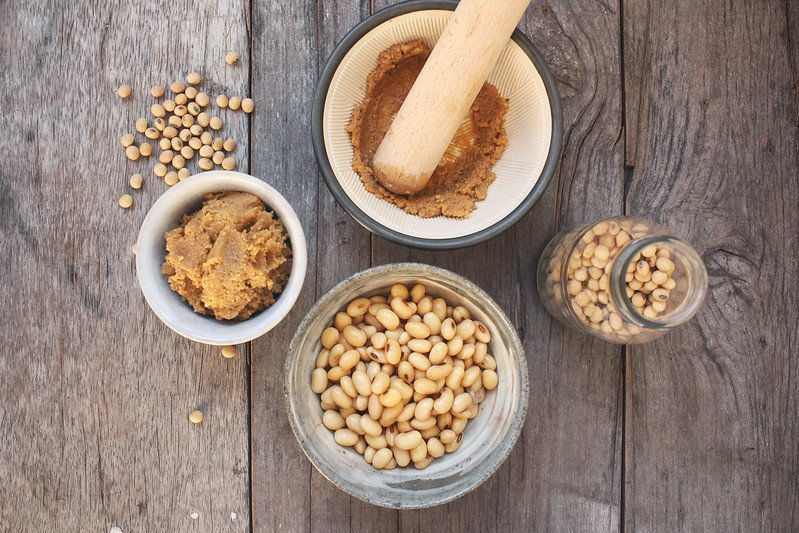
Magical Miso Soup
Miso (みそ or 味噌) is created by fermenting soybeans with the fungus kōjikin (Aspergillus oryzae), salt, and other ingredients like barley and rice. The outcome of the fermentation process is usually a thick paste used for preparing many traditional Japanese dishes. One Japanese staple is miso soup, rich in vitamins, minerals, and protein. Miso was an important nutrition source in feudal Japan and remains a favorite among Japanese today. Its popularity is not only in its delicious taste but in its many health benefits as well. Miso is fast gaining appreciation in Japan and all around the globe.
Some popular varieties of miso are genmai (soy and brown rice), hatcho (plain soy), mugi (soy and barley), natto (soy and ginger), kome (soy and white rice), and soba (soy and buckwheat).
Miso paste
Fermenting miso breaks down the often difficult-to-digest oils, carbohydrates, and proteins in soybeans, allowing the body to absorb the nutrients better. Unpasteurized miso also contains live lactobacilli, which is essential to the digestive process. It’s also rich in dietary fiber and polyunsaturated fats, beneficial in lowering bad cholesterol. The known nutrients in miso are vitamin E, vitamin B2, Vitamin K, potassium, lecithin, choline, calcium, and iron. It also contains linoleic acid which helps keep the skin soft and supple. Miso is a good source of antioxidants and eliminates free radicals from the body. (Free radicals are chemicals that destroy cells; they are linked to cardiovascular diseases, diabetes, and cancer.)
A major study published in 1981 by Dr. Takeshi Hirayama of the National Cancer Institute in Tokyo involving over 265,000 men and women age 40 and above indicates that people who eat miso soup daily are less likely to develop stomach cancer than people who never eat it.
Miso soup
Miso soup is high in sodium, which can be a factor in high blood pressure. A study conducted by Dr. Yoshio Uehara (Women’s University in Tokyo) tells us otherwise. One group of rats was given plain salt and another ate the same amount of salt with miso added. The rats who consumed salt and miso showed no signs of elevated blood pressure.
A study led by Seiichiro Yamamoto, Ph. D. involving over 20,000 women aged 40–59 for over a 10-year period showed that miso can also reduce the risk of breast cancer among women.
This astounding finding is attributed to the presence of isoflavones in miso that inhibit the development of breast cancer. According to the study abstract published in the Journal of the National Cancer Institute, “frequent miso soup and isoflavone consumption was associated with a reduced risk of breast cancer.”
